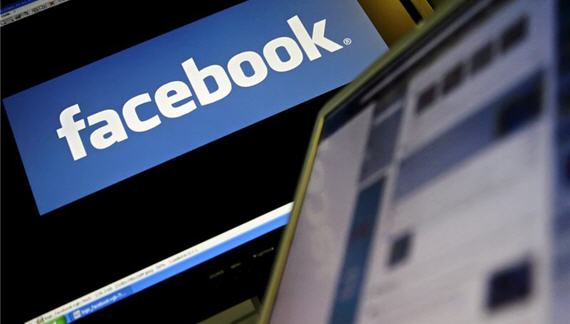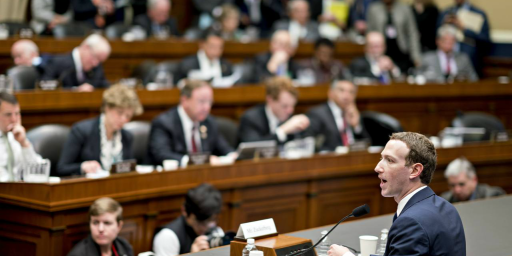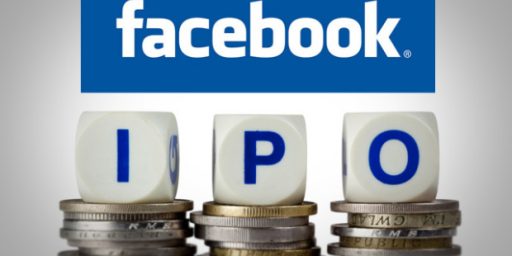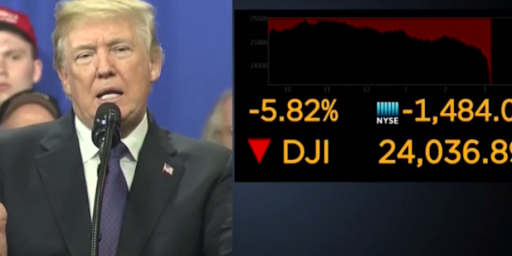Facebook’s Share Price Continues To Tumble As Reality Sets In
Facebook's stock has lost nearly 50% of its value since the company went public, and the plunge probably isn't over.
The heady days of the run-up to the Facebook I.P.O. didn’t last very long. Indeed, within hours after the stock first went public, it fell below it’s initial offering price and never went back. In the weeks since then, it’s been on a stead downward path to the lower $20/share range, but yesterday it finally crossed the point where a share of Facebook is now worth nearly 50% less than it was on the day the company went public:
Facebook, Inc’s stock price plumbed a new low Thursday as early investors were freed to sell some of their stakes, leaving the once-prized stock down nearly 50% from its debut and forcing executives of the young Internet giant to pump up morale.
Facebook Chief Executive Mark Zuckerberg is no longer brushing off concern about his company’s sinking stock price, acknowledging to employees for the first time that the selloff could hurt them.
Mr. Zuckerberg has long exhorted employees not to pay attention to the stock price, instead pushing them to focus on developing the social network. But in a companywide meeting earlier this month, he conceded that it may be “painful” to watch as investors continue to retreat from Facebook’s stock, according to people familiar with the meeting.
The meeting was part of a new effort over recent weeks to buck up morale.
Mr. Zuckerberg’s turnabout may have steeled employees ahead of Thursday, when some early Facebook investors—but not employees—were able to cash out for the first time since the company’s initial public offering in May.
Facebook shares hit a new low on Thursday, falling 6.3% to $19.87 as more than 271 million shares—or nearly 13% of those outstanding—became eligible for sale.
Mr. Zuckerberg’s turnabout may have steeled employees ahead of Thursday, when some early Facebook investors—but not employees—were able to cash out for the first time since the company’s initial public offering in May.
Facebook shares hit a new low on Thursday, falling 6.3% to $19.87 as more than 271 million shares—or nearly 13% of those outstanding—became eligible for sale.
Rules that restricted investors from selling their stakes immediately after Facebook’s IPO expired only for those who sold stock in the offering. The select group includes venture-capital firms such as Accel Partners and Greylock Partners and Wall Street firms like Goldman Sachs Group Inc. and Tiger Global Management.
Employees who own Facebook shares are only able to watch at this point. Lockup expirations in October, November and December will allow Mr. Zuckerberg and other employees to sell more than 1.4 billion shares. The biggest lockup expiration, freeing more than one billion shares, is set for Nov. 14. The last lockup expires next May.
For many employees, however, selling shares later this year may not be a palatable option. Facebook’s stock has so far fallen about 48% since the IPO, pushing its market capitalization down to about $42.6 billion.
The drop-off in stock price has led to a revival of a discussion that some were having before the company went public. Namely, whether or not he is the right person to lead Facebook now that it is a publicly traded company:
The deepening slide in Facebook Inc.’s stock is fueling talk once considered implausible on Wall Street and in Silicon Valley.
Should Mark Zuckerberg, the social media visionary but neophyte corporate manager, step aside as CEO to let a more seasoned executive run the multibillion-dollar company?
In that scenario, Zuckerberg would remain as the creative force propelling Facebook’s technological innovation. But the 28-year-old would cede the CEO title to someone better suited to overseeing operations and building rapport with finicky investors — mundane but essential duties for which Zuckerberg has shown little appetite or aptitude.
“There is a growing sense that Mark Zuckerberg, talented though he may be, is in over his hoodie as CEO of a multibillion-dollar public company,” said Sam Hamadeh, head of research firm PrivCo. “While in many cases a company founder can, and does, grow into the job, things are happening so quickly that there is precious little time here for Zuckerberg to do that.”
This isn’t an unfair point, but the truth of the matter is that Facebook’s problems going forward may not have anything to do who heads the company. Their chief sources of revenue is online advertising, to the tune of nearly $900 million is the must recent reporting quarter. That number is actually is actually surprising to me, because I almost never notice the ads on Facebook, must less click on any of them, when I’m on the site. More importantly, though, a growing number of people access their Facebook accounts via mobile devices and, so far, the company has not been able to come up with a viable method for monetizing the mobile experience. It’s not going to be an easy task, largely because the screen space on an iPhone or Android based phone simply isn’t big enough to put ads anywhere without making the user experience completely unpalatable. As more and more people shift their “Facebook experience” to mobile devices, the ad revenue is likely to dry up and the prospects for Facebook living up to the dreams of those who bought into the I.P.O. become more unlikely.
It strikes me that this is something that won’t change even if Zuckerberg is removed from his current position. Indeed, given that he is the man who has been the site’s chief designer from the beginning, I can’t think of anyone who could come up with a solution to this problem other than him, assuming there is one. Nonetheless, if the stock price continues to fall, which it is likely to as more and more shares become available to be traded over the next several months, shareholders are going to start getting nervous and putting pressure on the Board of Directors. You will recall that, after Apple hit a brick wall in the 1980s, the company’s board forced Steve Jobs out and brought in John Scully, who had previously run Pepsi, because of similar concerns. Sculley, of course, didn’t exactly shine at Apple and Jobs came back, but the forces that pushed Jobs out in 1983 are the same forces that may force Zuckerberg to step aside as CEO in favor of a more experienced business person.







Facebook seems to be a platform in search of a business model. I am not really seeing it – people go on Facebook to catch up with their friends and post photos, not to click on ads.
I agree with your take on this Doug. I’d like to add that any person brought in to be CEO will focus on the short term share price, and probably turn to cost cutting as a means of quickly increasing the EPS, which will probably have a negative impact on the tech side of the business. But, I guess that’s what happens once you go public – your fiduciary responsibility becomes the share holders profits.
The drop in Facebook stock price is only a surprise to people who didn’t analyze the situation: what’s your product and how do you get your cash flow?
I’m been watching with similar amusement what’s been happening at Groupon. Similar mush-for-brains business plan analysis.
Kevin Drum‘s analysis seems right to me. Favorite paragraph:
“Did Zuckerberg overvalue the stock during Facebook’s public offering? Maybe. But nobody put a gun to investors’ heads and made them buy it. Did this “siphon extra profit for the company”? Sure. But contrary to the febrile expectations of Wall Street executives who think the world guarantees them a quick profit every time they lift their eyebrows, that’s what an IPO is for: to raise money for the company, not to give a guaranteed pop to early buyers. Zuckerberg would have been negligent not to squeeze every penny he could from the IPO.”
Can’t wait until Facebook sells all its data to spammers.
@Moosebreath:
Indeed, in fact it says a lot about what’s wrong with American banking that the one time a bank acutally made financial decisions the interests of their actual client rather than the interests of other bankers, this is being treated as something unethical.
I am shocked… SHOCKED…. that yet another wunderkind managed to rig the Wall Street Roulette game to his own benefit…. or not.
Wall Street is a shell game. Now you see it… Now you don’t. Yeah, that is where the real money is made…. Off of rubes like you and, well, not me. Seriously, why would anyone in their right mind go there? 401K’s? They are corporate mandated slush funds (set up under cover of law) for the Cons on Wall Street to make billions off of and then launder the proceeds back to the corporate overlords.
Can I explain it all? No. Do I have a clue about the big picture and how it all works? No. But in early 2007 I told my wife to get her 401K out of the stock market. 2 days later she told me she couldn’t.
That was when I knew the game was rigged. Wake up folks. They will never let the likes of us into their club.
The Zuck is a well known elitist liberal. The reason his site and stock are declining is because the silent majority has stopped associating with him and his site due to his radical activism.
Facebook was overvalued by the investment community, and the reality is that Zuckerberg and his team have yet to firm up a business model that has FB securing a predictable revenue stream based on their substantial social contacts base. We’ll see if Zuckerberg has the ability to take FB any further than that IPO.
In the meantime Zuckerberg and his preferred investors got theirs.
Indeed Facebook was way WAY over valued and I don’t see the stock going anywhere but down. It’ll be a nice $2-5 stock in the future…
Maybe we can avoid Internet Bubble the Return.
@The dangers of pushing a liberal agenda:
Triumph is back!
OMG I’ve missed that dude